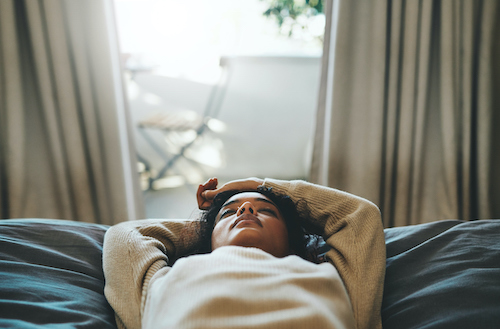By Dr. Sharon Stills, NMD
Women’s sleep patterns are closely intertwined with their stress hormones. So — surprise, surprise — when you’re stressed, you often experience sleep disruptions at the same time.

Whether it’s tension from your job, family or marriage problems, the neighbor’s dog barking, a disagreement with someone on Facebook, or even just getting stuck in a traffic jam on the way home from work, stress triggers can cause levels of the “alert” hormone cortisol to surge. Over time, when stress becomes chronic, your body may come to view everything as a threat. Then cortisol remains stubbornly high — keeping your body and brain on red alert and unable to sleep.
Is your mind racing night after night? That’s a prime sign that you could have an underlying hormonal issue feeding this vicious cycle of sleeplessness.
Stress can disrupt your hormones and sleep patterns in other less direct ways too. For example, melatonin is one of your main sleep hormones. It’s triggered as daylight starts to decrease, signaling to your brain that it’s time to start winding down and go to sleep.
If after another stressful day juggling all your responsibilities you wind down by watching a movie on your laptop or scrolling through social media, this exposure to computer and electronic device screens before bed can interfere with melatonin production. The “blue light” emitted by these devices can trick the brain into perceiving the blue light as daylight. You lose sleep as a result.
So, now that we know what might be contributing to your sleep problems, let’s talk about the solutions. When I help women with their sleep issues, I find that rebalancing cortisol and melatonin is really effective for resetting patterns for healthier sleep.
Here are my three favorite tips to try:
1. Give yourself time to drift off. Going to sleep at 10 pm does not mean lying down at 9:55 and expecting to be asleep in five minutes. When you don’t fall asleep in the short window you give yourself, this can trigger stress. This causes cortisol to lift instead of decrease. This just makes the problem worse!
I like to get in bed at 9 pm with an hour to read, listen to soothing music and just enjoy my bed. It’s freeing to know I have nine hours in bed and only need to spend eight of them asleep.
You can also create little rituals around bedtime to help your body (and cortisol production) into wind-down mode. Reflect on the day by writing in a journal, noting things that inspired you or made you feel grateful. Take a hot bath or drink a cup of non-caffeinated herbal tea — but remember no cookies with that tea. Stop eating three hours before bedtime so you’re not digesting food while trying to fall asleep.
2. Curb your cortisol. If your sleep is in really bad shape from stress, then you’ll need to more directly dial back over production of cortisol. To help do this, you can try a really good natural sleep supplement with L-theanine and passion flower for quieting cortisol production and calming your thoughts. Other helpful nutrients for sleep include calcium and magnesium — combined, they have a very relaxing effect, especially if stress creates muscle tension.
3. Stop screen time from messing with your sleep hormones. Put your electronics to bed at least two hours before your own bedtime to avoid sleep-disrupting blue light and sleep with your room in total darkness. To boost melatonin levels, you can try a melatonin supplement to help your body return to normal circadian and sleep rhythms. You can also snack on cherries in the evening! The juicy red fruit is a food source for melatonin. If you can’t find fresh cherries, try drinking a small amount of tart cherry juice.
When you get enough restful sleep, you have in your hands the key to optimal health and vitality. In all seriousness, sleep needs to become your new super power!
You can find more sleep tips in my related blog: 4 sleep secrets from Dr. Sharon Stills.












